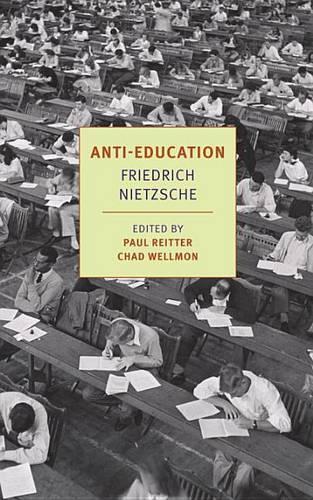
Anti-Education
(Paperback, Main)
Publishing Details
Anti-Education
By (Author) Friederich Nietzsche
Translated by Damion Searls
Introduction by Paul Reitter
Introduction by Chad Wellmon
New York Review Books
New York Review Books
15th December 2015
11th February 2016
Main
United States
Classifications
General
Non Fiction
193
Physical Properties
Paperback
136
Width 128mm, Height 204mm, Spine 10mm
170g
Description
In 1869, at age 25, the precociously brilliant Friedrich Nietzsche was appointed to a professorship of classical philology at the University of Basel. He seemed marked for a successful and conventional academic career. Then the philosophy of Schopenhauer and the music of Wagner transformed his sense of purpose. The genius of such thinkers and makers - like the genius of the ancient Greeks - was the only touchstone for true understanding. How then was education to answer to such genius Something more than sturdy scholarship was called for. A new way of teaching and questioning, a new philosophy...What that new way might be was the question Nietzsche broached in five vivid and popular lectures delivered to the public in Basel in 1872. Following a chance encounter in the country, an old philosopher, his former student, and two very wet-behind-the-ears undergraduates embroil themselves in a discussion of the current state of education, devoted, they concur, on the one hand to the democratization of shallow learning, and on the other to fostering a narrow specialization that serves the interests of industry and the state. Neither of these, the philosopher insists, constitutes true learning, which can only arise out of a determined attention to the genius of language, written and spoken, instead of practical ends, however newsworthy. Composed in emulation (and to some degree as a satire) of a Platonic dialogue, Anti-Education presents a stimulating, provocative, and thoroughly timely reckoning with one of the great problems of the day.
Reviews
Nietzsche does not belong entirely to philosophers. He was a philosopher-poet concerned not simply with describing and explaining the world as he found it, but with identifying and employing the electrifying arts that make the world appear uncanny and ineffably deep.Tamsin Shaw
Nietzsche wants to hear idols break. Dismay, exasperation, anger, outrage, disgust, humiliation disappointment: they fuel his philosophy, and it is little without them. Exhilaration, joy, exuberance, excess: they feed it too.William H. Gass
Paul Reitter and Chad Wellmons introduction and notes helpfully contextualize Nietzsches barbs, though much of what Nietzsche has to say transcends the milieu in which it was written, and many of his criticisms will resound with readers todaythis translation, with its useful notes and introduction, certainly provokes and surprises. Jon Morris,Popmatters
"Whether we acknowledge it or not, we continue to live within the intellectual shadow cast by Nietzsche. Postmodernism, deconstructionism, cultural relativism, the "free spirit" scorning bourgeois morality, even New Age festivals like Burning Man can all ultimately be traced to him." --Francis Fukuyama, The New York Times Book Review
"Prof. Nietzsche was one of the most prominent of modern German philosophers, and he is considered the apostle of extreme modern rationalism and one of the founders of the socialistic school, whose ideas have had such a profound influence on the growth of political and social life throughout the civilized world...his doctrines however, were inspired by lofty aspirations, while the brilliancy of his thought and diction and the epigrammatic force of his writings commanded even the admiration of his most pronounced enemies, of which he had many." --The New York Times
"Having challenged the foundations of all external authority, Nietzsche demonstrated that the intellect, once it frees itself of all binding illusions philosophical, religious, and cultural, knows no piety, no party, and no platform." --Jennifer Ratner-Rosenhagen, The Making of the American Nietzsche
Author Bio
Friederich Nietzsche (1844-1900) was a German philosopher, essayist, and critic whose writings about morality, truth, language, aesthetics, and nihilism are considered cornerstones of Western philosophy. Damion Searls has translated many classic twentieth-century writers, including Proust, Rilke, Elfriede Jelinek, Christa Wolf, Hans Keilson, and Herman Hesse. For NYRB Classics, he edited Henry David Thoreau's The Journal: 1837-1861, translated Nescio's Amsterdam Stories, and Robert Walser's A Schoolboy's Diary. He has received Guggenheim, National Endowment for the Arts, and Cullman Center fellowships and is currently writing a book about Hermann Rorschach and the cultural history of the Rorschach test. Paul Reitter is professor of Germanic languages and literatures and director of the Humanities Institute at Ohio State. His work has appeared in both scholarly journals and venues such as Harper's Magazine, Bookforum, The Paris Review, The Nation, and The Times Literary Supplement. He is the author of three books, and he recently collaborated with Jonathan Franzen and Daniel Kehlmann on The Kraus Project. Chad Wellmon is the author of Becoming Human: Romantic Anthropology and the Embodiment of Freedom and Organizing Enlightenment: Information Overload and the Invention of the Modern Research University. He is Associate Professor of German Studies at the Institute for Advance Studies in Culture at the University of Virginia. He is also editor of the Infernal Machine.
